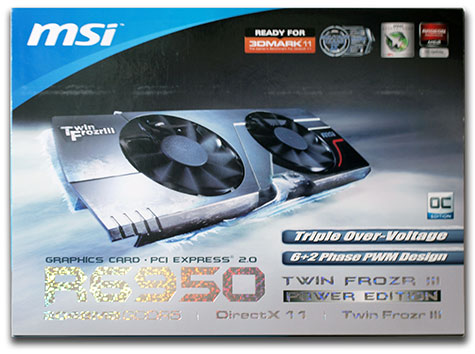MSI R6950 Twin Frozr III Power Edition Review
Over the last couple of years, MSI has made a concerted effort to bolster their reputation as a premiere brand in the PC enthusiast space. MSI’s motherboards, graphics cards, notebooks, and virtually every other high-profile product family in their repertoire has been revamped and updated in some way to differentiate them from the competition. Whether or not MSI’s efforts have paid off across the board is a matter of debate, but there’s little doubt that the company’s “Twin Frozr” line of graphics cards stand out from plain-vanilla reference cards.
The product we’ll be looking at today is the MSI R6950 Twin Frozr III. As its name suggests, the R6950 Twin Frozr III is powered by AMD’s Radeon HD 6950 GPU and the card sports MSI’s third-generation Twin Frozr cooler. MSI did more with the R6950 Twin Frozr III than swap the reference cooler with one of their own design, however. The R6950 Twin Frozr III is outfitted with a custom PCB and has a couple of other interesting additions as well. Check out the specs below and then we’ll move on to some of the more juicy details, benchmarks, and some overclocking action.

|
| Graphics Engine | AMD Radeon HD 6950 |
| Bus Standard | PCI Express x16 2.1 |
| Memory Type | GDDR5 |
| Memory Size(MB) | 2048 |
| Memory Interface | 256 bits |
| Core Clock Speed(MHz) | 850 |
| Memory Clock Speed(MHz) | 5200 (1300MHz, actual) |
| DVI Output | Single-Link DVI-D x1, Dual-Link DVI-I x1 |
| D-SUB Output | 1 (optional, via DVI to D-Sub adaptor) |
| HDMI-Output | 1 |
| Mini DisplayPort | 2 |
| HDCP Support | Yes |
| HDMI Support | Yes |
| Dual-link DVI | Yes |
| DirectX Version Support | 11 |
| OpenGL Version Support | 4 |
| CrossFire Support |
Yes |
Looking at its features and specifications reveals one of the MSI R6950 Twin Frozr III’s differentiating attributes—it’s overclocked from the factory. The Radeon HD 6950 GPU powering the card is bumped up from the reference design’s 800MHz to 850MHz and the memory clock has been increased from the reference design’s 1,250MHz to (5Gbps effective) to 1,300MHz (5.2Gbps effective). The increases in GPU core and memory clocks will obviously give the card a performance edge over straight-up reference designs, but in addition to tickling the frequencies, MSI has tweaked a number of other aspects of the Radeon HD 6950 as well.







